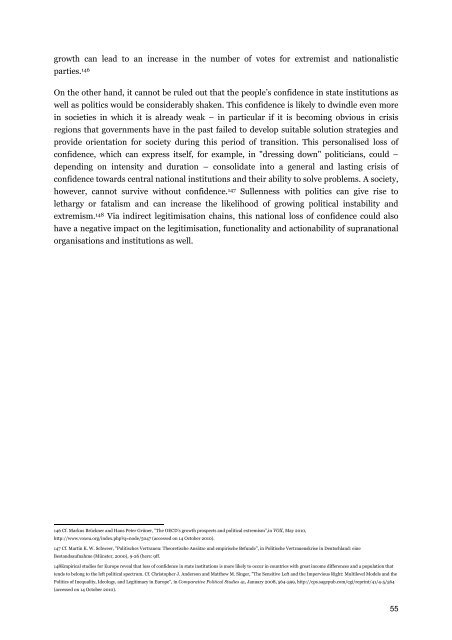PEAK OIL
PEAK OIL
PEAK OIL
You also want an ePaper? Increase the reach of your titles
YUMPU automatically turns print PDFs into web optimized ePapers that Google loves.
growth can lead to an increase in the number of votes for extremist and nationalistic<br />
parties. 146<br />
On the other hand, it cannot be ruled out that the people’s confidence in state institutions as<br />
well as politics would be considerably shaken. This confidence is likely to dwindle even more<br />
in societies in which it is already weak – in particular if it is becoming obvious in crisis<br />
regions that governments have in the past failed to develop suitable solution strategies and<br />
provide orientation for society during this period of transition. This personalised loss of<br />
confidence, which can express itself, for example, in "dressing down" politicians, could –<br />
depending on intensity and duration – consolidate into a general and lasting crisis of<br />
confidence towards central national institutions and their ability to solve problems. A society,<br />
however, cannot survive without confidence. 147 Sullenness with politics can give rise to<br />
lethargy or fatalism and can increase the likelihood of growing political instability and<br />
extremism. 148 Via indirect legitimisation chains, this national loss of confidence could also<br />
have a negative impact on the legitimisation, functionality and actionability of supranational<br />
organisations and institutions as well.<br />
146 Cf. Markus Brückner and Hans Peter Grüner, "The OECD’s growth prospects and political extremism",in VOX, May 2010,<br />
http://www.voxeu.org/index.php?q=node/5047 (accessed on 14 October 2010).<br />
147 Cf. Martin K. W. Schweer, "Politisches Vertrauen: Theoretische Ansätze und empirische Befunde", in Politische Vertrauenskrise in Deutschland: eine<br />
Bestandsaufnahme (Münster, 2000), 9-26 (here: 9ff.<br />
148Empirical studies for Europe reveal that loss of confidence in state institutions is more likely to occur in countries with great income differences and a population that<br />
tends to belong to the left political spectrum. Cf. Christopher J. Anderson and Matthew M. Singer, "The Sensitive Left and the Impervious Right: Multilevel Models and the<br />
Politics of Inequality, Ideology, and Legitimacy in Europe", in Comparative Political Studies 41, January 2008, 564-599, http://cps.sagepub.com/cgi/reprint/41/4-5/564<br />
(accessed on 14 October 2010).<br />
55


